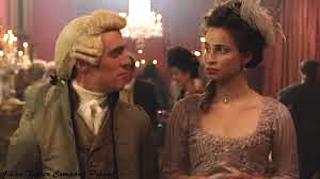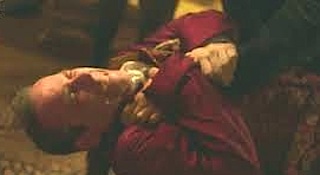
Kind of startling to realize that there’s only one week to go before the finale of this new series air, thanks to PBS’s decision to run the last two episodes as a double header next Sunday. And on the whole, I’m glad that I watched. This new production has its merits, which I can appreciate despite the issues I’ve had with some of its casting and characterization choices. Every adaptation takes some liberties with its source material, after all. My personal beef tends to be with changes that either pervert the source material or fail to justify their existence (the kind that make me ask, “Why did they do that?”). Still, any Poldark-related project that leads people to discover and appreciate Winston Graham’s novels can be only a good thing.
Moving on to Episode 6, I’d call it a mixed bag. Like the curate’s egg, “parts of it were excellent”—or very good, at least—while others . . . oh, dear.

The Good
*Anything involving Demelza growing—as a woman, a wife, and a force of nature. Eleanor Tomlinson’s Demelza is softer, shyer, and a bit more vulnerable than her book-counterpart. I’ve worried about Ross riding roughshod over her, so I enjoyed her standing up to him at the Warleggan ball, after he left her alone to fend off all those amorous advances from rakes who thought she’d be easy pickings because of her origins. And I was glad that she was allowed to play an active role in Ross’s card game with Sanson, as she does in the book, rather than just look on in dismay and horror like Angharad Rees’s Demelza in the earlier series.
*Ross vs. Sanson. Effectively done, for the most part, with Ross appearing to become more drunk and incapable with every hand, only to drop the mask and expose Sanson’s cheating. I also enjoyed Robin Ellis’s return as Reverend Halse and his flashing a bit of Poldark temper, even while playing a character on the opposite end of the socio-political spectrum as Ross. Ellis still has remarkable screen presence, and—sorry, Mr. Turner—he will always be Ross to me. There was, however, one inexplicable omission in this whole sequence that merits inclusion in the WTF? section of this commentary.
*The prison sequences involving Jim Carter’s rescue were appropriately dark and grim. Some interesting/ironic detail was lacking, though. In the book, Jim was moved from Bodmin jail—the equivalent of county lock-up—to the much worse and more distant Launceston Prison because of the former was full of those newly arrested rioters. He also might have survived the fever, if it weren’t for a well-intentioned but foolish fellow inmate who bled him, which led to that gangrenous wound on his arm. I can see why they cut all this for simplicity’s sake, but I still regret the loss because it added more shadings to the situation.
*Ross’s drunken funk. In-canon and in-character. Sometimes I think the new series has been too keen on selling Ross as the brooding romantic hero and has ignored some of his darker, less admirable traits. But he can be a self-absorbed jerk at times, with a tendency to get lost—even wallow—in his own misery, bitterness, and moral outrage. Grief and anger over a friend/tenant, horribly dead before his time, is understandable, but it shouldn’t make you an asshole towards the ones you supposedly love, who still need your care and guidance. I appreciate that the episode didn’t soften or excuse Ross’s behavior. And Aidan Turner plays sodden-drunk almost too well.
*Verity’s advice to Ross—also from the book. It’s not clear in this series who is the elder, but in the books, Verity is two years senior to Francis and Ross, which gives her some influence over both, especially Ross. The incarnation of Verity has so often been depicted as dominated by the men in her family—particularly her selfish father—that it’s a welcome change to hear her give sound counsel to Ross about why he should attend the ball with his wife instead of brood at home with a bottle.

The Bad
*George finally showed his partiality for Elizabeth, but it was a case of too little, too late, as the series had failed to capitalize on previous meetings between the two. “Too little” is also an unfortunately accurate descriptor of George himself, because even Heida Reed’s Elizabeth looks like she could beat him up with one hand tied behind her. He looks and sounds like a schoolboy trying to put the moves on his teacher, instead of a powerfully ambitious social climber enchanted by a friend’s gracious, blue-blooded wife. Zero physical presence. Which is a pity because there are other characters in the Poldark universe whom Jack Farthing could play convincingly—like Ross’s foppish cousin, St. John Peter or Monk Adderley, a slimy London rake with designs on Demelza’s virtue. At a pinch, he could swap parts with Kyle Soller and make a believable Francis, who is described as compact and fair. As it is, I try to imagine all the pivotal encounters between Ross and George throughout the whole Poldark Saga with Farthing in the role, and just . . . no.

*Keren the Brazen Slut. Even in the books, she’s on the make and hot for Dwight, but enough of her perspective is given to explain her actions. She’s stuck all day in a poorly constructed, dimly lit house, with an uneducated husband who works long hours and has no ambition to move up, and the women in the community neither like nor trust her. Here, she’s just a cheap little tramp, who throws herself off a ladder on purpose to get Dwight’s attention (or so I’ve heard from viewers who saw the uncut version of the episode) and then starts scheming to get into his house and his pants as quickly as possible. (In the book, her accident and injury were genuine, and we also got to see her reaction to the inside of Dwight’s house, which has carpets, comfortable furnishings, and books. Not a palace, but much nicer than her own living arrangements.) Even more disconcerting, Keren’s cheapness looks way too modern: all slouch and sulk, with unkempt hair and overly rouged lips. And a ton of bad attitude. You half-expect her to be chomping on a wad of gum and drawling, “Yeah?” and “What’s it to yer?” when anyone addresses her. She stands out like a contemporary mall rat in what’s supposed to be 18th-century Cornwall.
*This Dwight’s inability to dodge or see through someone as cheap and obvious as Keren makes me doubt his intelligence. Especially since he’s been aged up to be Ross’s near contemporary, instead of being five or six years younger. That makes “the stupid” a bit less forgivable and isn’t likely to help him in the next phase of the story.

The WTF?
*St. Elizabeth of the Perpetually Martyred Expression. I believe I mentioned at the outset that I’m not opposed to a more nuanced, sympathetic depiction of the character. However, just as it’s not necessary to make Francis more of a failure than he is in the books, it’s not necessary to make Elizabeth so much more saintly and put-upon than she is in the same source material. I don’t know which was more irritating—the Cinderella scenario of Elizabeth remaking an old gown to spare Francis’s pride or Elizabeth entering the card room to rebuke Francis and Ross for being neglectful husbands. Both, especially the latter, are out of character. As the blue-blooded daughter of an ancient family, Elizabeth would have the position and presence to carry off a twice (or more) worn gown—and she’d know it. She would also consider it beneath her dignity to express public disapproval of her husband’s conduct. In the book, it’s Margaret—the former prostitute who married into the gentry—who alerts Ross to the men flocking around Demelza while he gambles with Sanson.
*Apropos of which, how could the series cut the dramatic climax to the card game? Because Ross does more than expose Sanson’s cheating. Once extra cards are found in Sanson’s hand and in his waistcoat pockets, Ross drags him out of the card room, down the terrace steps, and throws him in the river—which is mostly mud, but still makes a definite statement and causes great embarrassment for the Warleggans! That excision completely stuns me. Why pass up the chance to depict such a dramatic moment when it’s right there in the book? Why cut off the potential for a more exciting pay-off? It’s reminiscent of the way they watered down Demelza’s father crashing the christening, and every bit as disappointing. Viewers not familiar with the books may have been satisfied with what was shown, but as a book reader, I maintain, “we wuz robbed!” and I hope future big moments don’t fizzle out like this.
Until next time!

I enjoyed Episode 6 very much. I like to consider it foreshadow of how low Ross can sink as a character. However, he’ll really sink low in the upcoming Series 2 . . . if Debbie Horsfield will allow it.
If you’re referring to what I think you’re referring to, it should be very interesting to see how the new series handles that. Ross’s actions are hard to defend, and my own feeling is that he should have been strung up by his heels and beaten like a carpet for them. Graham kept the incident very grey in the book–he played up the ambiguity of what happened, but he never let Ross off the hook for it and the consequences haunted everyone well into the next generation. Horsfield seems to want to show Ross as a perfect romantic hero much of the time, which makes me wonder what approach she’ll take towards this highly unheroic behavior.
By the way, why are you expecting this series to be an exact replica of Graham’s novels? The 1975-77 wasn’t an exact adaptation. I’ve never heard of a movie or television production being an exact adaptation of any source of novel or play. Why do you expect this series to do exactly that?
I am not expecting this new series to be “an exact replica” of Graham’s novels, nor have I ever said so in any of my commentary. However, Horsfield and the other new writers have repeatedly stated how much they love the books and how they wished to do a more faithful adaptation of them, independent of the first TV series. Well, that sounds great in theory…except that they’ve taken their own significant liberties with the story and the characterizations, so it seems disingenuous to claim more fidelity to the original source material. I am not intrinsically opposed to departures from canon, if they make sense, but several changes Horsfield & Co. have made don’t, not to me at least. YMMV. And if faithfulness to the novels is the hill the new writers have chosen to fight on, as someone who loves the novels and was significantly influenced by them, I feel within my rights to challenge them when they go in a direction that seems bizarre or nonsensical.
I have my issues with the 1975-1977 series too, and someday I may get around to commenting on that version the same way I’ve done on the new one. But on balance, I think the earlier series got more things right than wrong. It’s too early to say how the reboot will do. There were things I liked quite a lot, and things I didn’t like at all. But overall, I appreciate that Poldark is being revived for a new generation and am awaiting Season 2 with interest. Thank you for commenting.